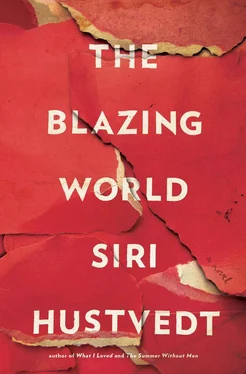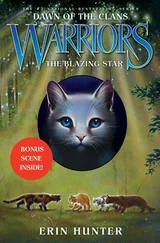B: The bad angel who comes sometimes at the dark hour, stealing around in Harry’s things, into her world of the metamorphoses and the changelings. The Barometer can feel him, his omens. I stay as the barrier, the needle speeds when he’s here. I can wrestle. I was on the team. I will wrestle. Jacob wrestled him. The sinew of Jacob’s thigh shrank.
PQE: Yes, they wrestled all night. I always found it rather homoerotic. But you don’t mean Bruno, do you?
B: Bruno is not an angel. Have you no eyes? Are you blind, blind and unkind? He comes when you’re gone, Phineas. He hides behind the buildings and the trash cans. He keeps his wings folded in, big, awful, veiny wings. He’s fallen, you know, fell from Heaven to here below, to keep us low, to build our ruin, but nothing broke when he fell, and now he roams through wood and waste, over hill and dale to the place where Longitude meets Latitude, you see, don’t you, he’s fallen down, the Arch-Enemy. If he touches you, you burn and shrivel. Look here on my arm.
PQE: You say the angel left that red mark on you?
B: A fiery finger of wrathful fate. He said, “Don’t say a word, you crazy fuck. Not one word.”
PQE: He said that? Not very angelic.
B: He said that, and then he turned around and walked down the hall, dragging his wings like peacock plumes behind him.
Maisie Lord (edited transcript)

My mother had to tell me and Ethan that Phinny was her front, because she knew the moment we saw The Suffocation Rooms we’d know she was responsible for them. Those lumpy figures, the heat in the rooms: No one but Mother made art like that. She just blurted it out: “Maisie, Phinny’s showing my work for me.” When I gaped at her and asked her if she had gone completely batty, she got that wrinkled, knowing look on her face, which always let me know a big explanation was coming, and she launched into a story about James Tiptree, the science fiction writer. According to Mother, for at least ten years no one actually saw Tiptree in the flesh, not even his editor. His secret identity caused a lot of speculation, and there were some people who thought that hiding behind the pseudonym there might be a woman, not a man. Robert Silverberg, another science fiction writer, wrote an introduction for a book of stories by Tiptree. He weighed in on the sex question and argued that just as no man could have written the novels of Jane Austen, no woman could have produced the stories of Ernest Hemingway or James Tiptree. Mother loved this part of the Tiptree drama because Silverberg’s faith in the writer’s unimpeachable masculinity turned out to be misplaced. When the actual person stepped out from behind the pen name, the macho Tiptree turned out to be Alice Bradley Sheldon.
But Mother stressed that nothing was simple. After she had invented Tiptree and before she unveiled herself as Alice Sheldon, the writer took on another persona, a female one she named Raccoona Sheldon, whose work was rejected by a number of publishers and deemed inferior to Tiptree’s. The writer, who had been praised as a man who could write feminist science fiction, now had a female mask, too. My mother said the bizarre name Raccoona had surely been inspired, at least on a subliminal level, by the masks raccoons don’t wear but simply have — the ones given them by nature. That’s the title of my third film, the one I’m working on now about my mother: The Natural Mask . The revelation that James Tiptree and Raccoona Sheldon were two sides of the same person didn’t make life simpler for Alice Sheldon. Although the women who had been friends with Tiptree by letter, including Ursula Le Guin, greeted the newly revealed Alice Sheldon warmly, a number of the men who had been writing to her vanished abruptly from her life.
Mother told me the whole story with shining eyes. We were sitting across from each other at her kitchen table, and she leaned toward me, lifting her index finger every now and then to make her points. What interested her was not simply substituting a man’s name for a woman’s. That was boring. No, she pointed out that Le Guin had suspected all along that Raccoona and Tiptree were two authors that came from the same source, but in a letter to Alice she wrote that she preferred Tiptree to Raccoona: “Raccoona, I think, has less control, thus less wit and power.”
Le Guin, Mother said, had understood something deep. “When you take on a male persona, something happens.”
When I asked her what that was, she sat back in her chair, waved her arm, and smiled. “You get to be the father.”
As her daughter, I didn’t like hearing my mother talk about being the father. I felt a visceral jolt under my ribs, but I started giggling and said something like “Oh, Mother, come on, you don’t really mean that.” But Mother did mean it. She told me that in 1987 Tiptree shot her husband and then killed herself. Mother said Sheldon couldn’t live without her man — not her husband, obviously, but the man inside her — and she believed that’s why she exploded into violence.
I retell the Tiptree story in my film. Alice, who was known as Alli to her friends, once said: “My biography is ambisexual.” Harriet Burden, known as Harry to her friends, could have said the same thing. It did not end there. My mother knew that telling me about her pseudonyms upset me because her father and my father were somehow mixed up in it. I suppose we all like to have people and things in their place, neatly outlined in black, but the world just isn’t like that.
We talked about Aven for a while and the death of Radish, who drowned in a glass of orange juice. My daughter had been so cavalier about the death of her noisy, difficult, but also jovial companion who lived in her throat that it had worried me. Mother laughed and said imaginary friends didn’t need funerals. They returned to “from whence they came,” and we both laughed.
And then we covered the Ethan territory. Mother and I always did. He was our shared obsession, the son and brother we couldn’t quite figure out so we always had to talk about him. He had just published his first short story in a literary magazine, and Mother was proud. “The Umbrella” is a curious tale about a man who forms an erotic attachment to his striped umbrella. Whenever it rains, he shudders with excitement at the prospect of opening the umbrella, and he has to work hard to resist pressing the little spring on sunny days, although he spends a lot of time admiring its beauty as it leans casually to one side in its stand. Like my brother, the story’s hero has rules for how to behave. Out in the street on rainy days under his umbrella, he doesn’t want anyone to see that he’s actually quivering with joy. To everyone he passes or meets, the umbrella should be only a thing — a tool for keeping off the rain. And then one day, after he has checked it with his coat at a restaurant and had his meal, the woman who hangs the outerwear retrieves the right coat but the wrong umbrella. A search ensues, but the striped umbrella is not found, and Ethan’s nameless hero is devastated, although he keeps up a false front for the obsequious manager, who apologizes profusely for the error. He walks into the street with the wrong umbrella, which he discards in a bin, and proceeds home in a deluge, getting wetter and wetter and colder and colder. The last sentence, which uses the feminine pronoun for the first time, is: “And no one would understand that she was irreplaceable.”
Mother thought the story was better than anything Ethan had written before, less pretentious, and I agreed, even though being titillated by a gendered umbrella struck me as another oddity in the catalogue of oddities that all together made up my brother. I had always been jealous of Ethan’s specialness. He always had to be handled so carefully, our eccentric boy with his stiff movements. He used to remind me of Pinocchio (before he became a real boy, of course). And he’d get so frustrated with stupid little things and throw tantrums. All the pounding on the floor, the howling and the kicking. Mother would hold him tightly in her arms and just let him wail. I was always told to “make allowances” for his “peculiarities.” Looking straight at her, I told Mother I had wanted peculiarities, too. I had wanted to get the special, Ethan boy-genius treatment, but I had been good old normal Maisie without a special bone in my body. I remember Mother looked shocked because I was so vociferous. She leaned across the table, took my hand, and said, “Maisie!”
Читать дальше













